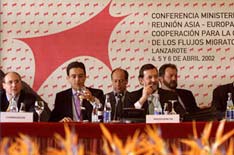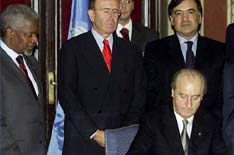Human trafficking ventures range from small-time, mom-and-pop operations to tightly run, well-organized structures that operate on a competitive international basis.
Amateurs and Professionals
Trafficking humans is big business: according to the UN, an $8 to $10 billion business. Players in this industry vary significantly in size, geographical range, and organizational structure. Amateur traffickers may operate on a local level, assisting potential migrants with a single border crossing; some work in coordination with a larger trafficking organization. There are also modest-sized trafficking rings that operate on a more permanent basis, employing practiced smuggling techniques and well-known trafficking routes to convey migrants from country to country. The most sophisticated trafficking operations are highly organized groups that function on an international basis, conducting the entire scope of the trafficking process, from recruitment to transportation to the migrant’s entrance into a destination country. Thanks to their far-flung network and complex structure, these groups adjust quickly to changes in national legislation, immigration, and law enforcement policies, and are adept at avoiding border surveillance.
The Participants
Larger international human trafficking groups are organized like actual businesses. Management and labor responsibilities are distributed to maximize the greatest profit and allow rapid response to change. Competition from other trafficking groups as well as crackdowns by law enforcement and immigration officials can both transform market dynamics. According to an economic analysis of organized crime and human trafficking by Andreas Schloenhardt of the Australian Institute of Criminology, the make-up of human trafficking organizations can be divided into the following roles.
1. Arrangers/Investors invest money in and supervise the operation of the entire trafficking enterprise. These individuals remain largely anonymous, virtually if not entirely unknown to those who work in the lower levels of the operation, so that they cannot be connected to any particular crime perpetrated by one of the organization’s branches.
2. Recruiters enlist potential migrants and arrange for their departure. They are also in charge of collecting smuggling fees at transit points as well as in the migrants’ destination country. Often, they are not aware of the specific trafficking route on which their recruits will embark, nor are they paid as full-time employees. Rather, they are compensated on a case-by-case basis.
3. Transporters are responsible for transporting the migrants from their countries of origin to a major city in the migrant’s destination nation, as well as avoiding detection by law enforcement. Generally, they work with an intermediary, rather than through direct contact with the trafficking organization.
4. Corrupt Public Officials provide trafficking organizations with fake documents and other means to allow illegal migrants passage across the borders of their countries. The cooperation of these individuals, who may work within governmental or law enforcement offices, is generally secured with a bribe.
5. Informers gather information on border surveillance, law enforcement, and immigration procedures, in addition to any other details that may prove valuable to the traffickers.
6. Guides and Crew Members assist in the transportation of migrants from one transit point to the next. In some cases, they charter the actual transportation vessels and accompany the migrants throughout their journey.
7. Enforcers are illegal immigrants who are chosen to maintain order during the journey from source to destination countries, often by means of threats and violence.
8. Debt Collectors help collect the smuggling fees from migrants once they have reached transit or destination countries, often by means of violence or extortion.
9. Money Launderers cover up the trail of cash, which may be reinvested in additional criminal activities or legal enterprises or dispersed through a series of hard-to-trace transactions.
10. Supporting Personnel and Specialists are individuals hired to perform specific tasks such as providing accommodations or assistance to migrants in transit. They have no specific attachment to the trafficking organization and are often local people employed on a for-hire basis.
- Previous: Introduction
- Next: Criminal Groups




